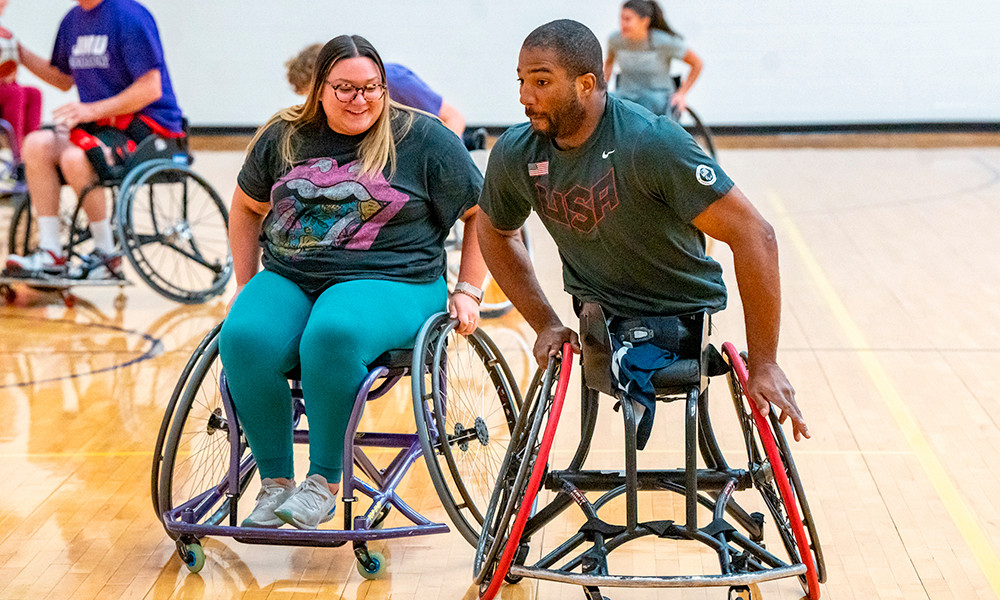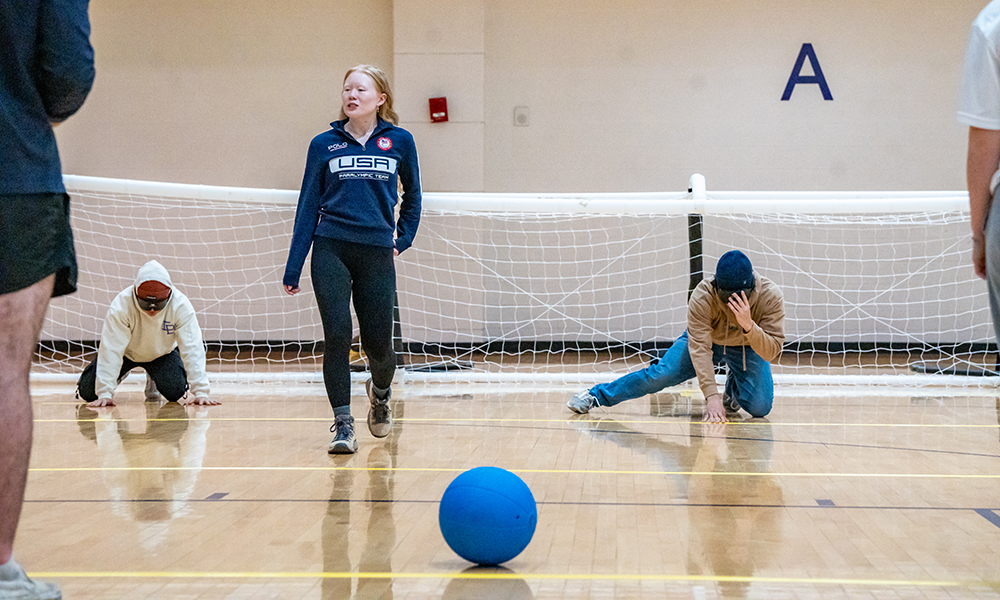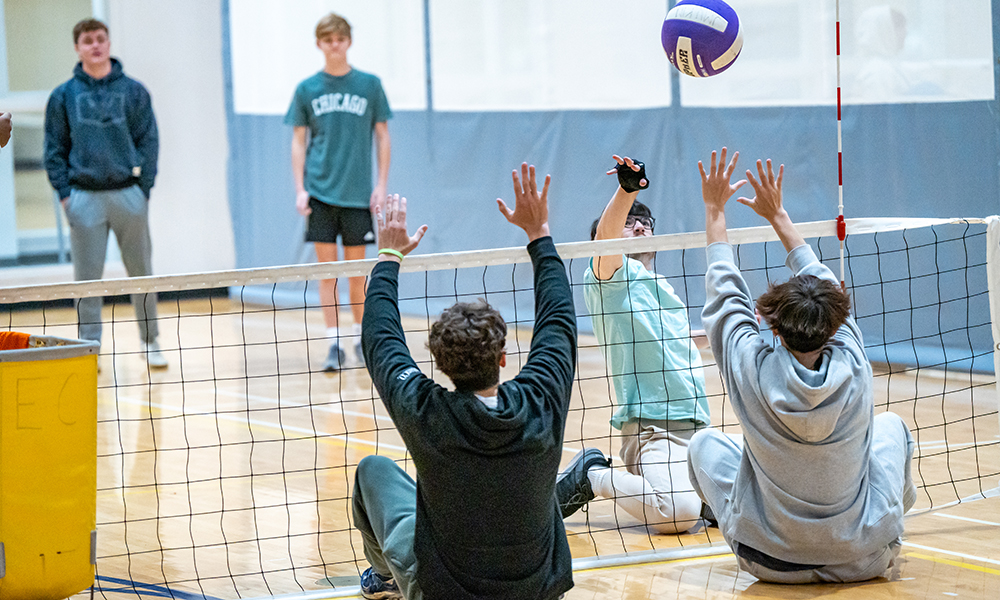Strength on and off the court
Professor alumna incorporates disability sport in kinesiology curriculum.
Featured Stories
SUMMARY: Cathy McKay (’98), associate professor of kinesiology, decided to pilot the Paralympic Skill Lab at JMU in part “because the K-12 research shows that it works great to change attitudes and perceptions about disability and disability sport.”
Now in its ninth year at JMU, the Paralympic Skill Lab has succeeded in introducing Kinesiology students to Parasports and giving them the opportunity to learn from some of the best Paralympic athletes and Para-athletes in the country.
Cathy McKay (’98), associate professor of kinesiology, started the skill lab at JMU in 2015 and has seen the growth of the program firsthand.
“When we started, we were offering the lab to just a small group of KIN 100 students, and then once we saw that it was really successful, we collected some pilot data to see what the student experience was,” McKay said. “From there, I started writing grants in order to get funding and offer it to the wider KIN 100 program. It grew from about 20 or 30 students to a reach of 300 to 400 a year.”
But for McKay, her PSL journey did not start at JMU. She conducted her dissertation research on Paralympic School Day, a program created by the International Paralympic Committee for K-12 schools. McKay found plenty of research, including her own, about the impact on elementary, middle and secondary schools, but Paralympic School Day had never been used at the college level.
“This was one of the reasons I decided to pilot it at JMU, because the K-12 research shows that it works great to change attitudes and perceptions about disability and disability sport,” McKay said. “My hope, and what I came to find out was accurate, is that it would change attitudes and perceptions about disability and disability sports for college students as well.”
As a professor, McKay sees the potential for a future of acceptance, especially among her students who have attended the skill lab for years.
“They’re our future teachers, our future business leaders, our future government leaders — these are students who are going to make a difference in their societies and communities, and that’s what JMU is all about,” McKay said. “When students are able to come to an activity like the PSL, where they are able to shift the paradigm through which they view disability, then that is going to make a difference, a ripple effect.”
The fall semester lab, held Nov. 30 at the University Recreation Center, featured athletes spanning three sports: wheelchair basketball, sitting volleyball and goalball. Nicky Nieves, a two-time gold medalist in the Paralympic Games and the founder of Limitless People Inc., played volleyball and now sitting volleyball. Trevon Jenifer is also a two-time gold medalist in the Paralympic Games and is a Team USA wheelchair basketball athlete. Nieves and Jenifer have attended PSL events for years at both the K-12 and college levels.
“We met Cathy McKay about 10 years ago in New York when she had her first skills lab, and we have been linked ever since,” Jenifer said. “It’s awesome because we are getting to teach the next generations.”
Nieves has seen the differences in acceptance among student participants, but the one thing that never wavers is their excitement to get out on the court and try an adaptive sport.
“For the younger kids, they don’t really see it as an adaptive sport,” Nieves said. “They just see it as a new sport that they don’t know. College, though, there is the awareness of ‘Hey, it is an adaptive sport, and it is different,’ but it is also a newfound respect, because people don’t understand how hard it is and how much energy, effort and dedication people put into it until they get to talk to Paralympic athletes and other Para-athletes.”
Jenifer shared his experience with younger students, particularly the way they interact and initially react with the Para-athletes and how the PSL and Paralympic School Day programs can bring a new outlook to the societal challenges the athletes face.

“When we are out and about in the community, there are so many unconscious biases that we make,” Jenifer said. “Kids will be like, ‘Mommy, what’s wrong with him?’ We constantly see the parent trying to remove their kid from the situation, telling them not to ask or not to say that, so you are then showing your kid not to interact with something that is different than you.”
“So for us, when we get in these situations where kids aren’t exposed to this, it’s our time to squash all preconceived notions that people have about what disability is and what disability does.”
Jacob Tyree, another athlete at the skill lab in November, has competed in traditional sports as well as adaptive sports. Born and raised in Roanoke, Virginia, he grew up playing baseball, which he called his love and passion. When he was 10 years old, Tyree had cancer and underwent surgeries at the University of Virginia. After the procedures, he no longer had access to baseball and felt as though basketball was the next best option.
“Luckily, I was athletic, and I could start to fall in love with the sport that I now truly love. I played in Charlotte, North Carolina, as that was the closest access I had to a sport as a junior athlete — not a lot of programs in the southwestern Virginia area.”
Noticing the lack of access in the region and wanting to make a change, Tyree started the Roanoke Stars wheelchair basketball program, a branch of the nonprofit organization Blue Ridge Independent Living Center. Roanoke Stars gives people with disabilities the chance to come out and try sports, and connects them with additional programs if basketball isn’t their first interest. Tyree was able to help UVA and Virginia Tech create programs and met McKay through JMU’s interest in developing a similar program.
Tyree works full-time for Move United, an adaptive-sports nonprofit with 225 chapters in 45 states. Each chapter focuses on a variety of adaptive sports and partakes in various events, similar to PSLs and Paralympic School Day. Tyree is focused more on the training and education side of the organization, working to break down the stigmas and stereotypes about what adaptive sports will look like and what barriers the disability community faces in the world of sports.
“It’s important at events like this because regardless of your ability or disability, you get in a wheelchair and try it for the first time and try out wheelchair basketball or goalball or seated volleyball, and you quickly realize you come in with an idea of what we are as people, but you are going to leave here just looking at us as athletes,” he said.
Lindsay Staub and Kendall Williams are fourth-year students in JMU’s Physical Health Education Teacher Education program. After they complete their degree, they will be licensed to teach K-12 students new, physical activities to keep them active for a lifetime. Staub and Williams returned to the PSL a second time in the fall after participating in last year’s program.
“This time I think I’m more reciprocal to learning about inclusive sports. Last time I was just so worried about if I’m going to be able to control the wheelchair or actually play, and this time I feel like I can soak it in and enjoy the experience,” Williams said.

For Staub, making events accessible to students at JMU is a great way to broadcast information about adaptive sports. “There are certain programs and groups local to us in Harrisonburg that a lot of people would never know about, because we don’t learn about them in school or see them as often as other programs. Getting the message spread and also getting the idea of the sport and awareness of it out there is important.”
For years, McKay, the athletes and the skill lab itself have worked together to foster an inclusive, adaptive environment for students at JMU. Continuing to implement these kinds of opportunities and events will further the university’s diversity, equity and inclusion efforts, and will continue to expose students like Staub and Williams to the world they will soon influence through their teaching.
For athletes like Nieves, Jenifer and Tyree, the skill lab continues to break down barriers, challenge stereotypes and promote a culture of understanding among communities that have more similarities than we might expect.
“We are teaching the teachers of tomorrow, creating generational impact and curving the stigmas of what Paralympic sport is, and changing the curriculum for adaptive education like what we had to go through,” Jenifer said.
